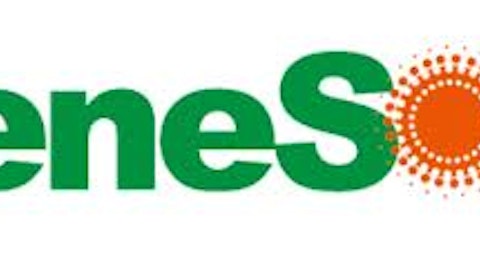
Roller coaster stocks
Both Banco Macro SA (ADR) (NYSE:BMA), with a beta of 1.31, and BBVA Banco Frances S.A. (ADR) (NYSE:BFR), with a 1.71 beta, have higher than average volatility as measured by beta and a wide spread between their 52-week highs and 52-week lows. The volatility of these stocks is reinforced by the fact that the other Argentine bank in the peer group, Grupo Financiero Galicia S.A. (ADR) (NASDAQ:GGAL), has a similar beta at 1.41.
Out of the three stocks — Banco Macro SA (ADR) (NYSE:BMA), BBVA Banco Frances S.A. (ADR) (NYSE:BFR) and Grupo Financiero Galicia S.A. (ADR) (NASDAQ:GGAL) — Grupo Financiero Galicia has the lowest P/E ratio and the highest return on equity. While its results have been mostly lower on the whole, it seems to be the best bet out of the three. Another positive for Grupo Financiero Galicia S.A. (ADR) (NASDAQ:GGAL) is that despite the fact that it has a negative return over the last year, its stock price has gone down the least out of the three Argentine banks. The worst performing of the three is Banco Macro SA (ADR) (NYSE:BMA), which has both the highest P/E ratio and the lowest return on equity. BBVA Banco Frances S.A. (ADR) (NYSE:BFR) is squarely in the middle, and is a better investment than Banco Macro SA (ADR) (NYSE:BMA) because BBVA Banco Frances S.A. (ADR) (NYSE:BFR) has the backing of a global bank behind it. The fact that BBVA owns BBVA Banco Frances means that it has potentially greater resources than Banco Macro.
More than meets the eye
Without a discussion of Argentinian government policy, one cannot understand the issues that Argentine banks face. One of the largest issues facing Argentina is the inflation rate, which is estimated at between 25%-30%, but officially is much less. The false numbers produced by the government led the International Monetary Fund to censure Argentina and The Economist to no longer publish the official statistics, calling them “bogus.” According to a recent report by Reuters, the Argentine peso has lost over 22% of its value this year on the market. This devaluation, and the risk of further devaluation after the mid-October elections, is causing investors and businesses to be wary of investing due to financial uncertainty. Argentina already has a bad reputation in the worldwide financial sector, thanks to the 2002 debt default. This has very wide ramifications for banks like Banco Macro SA (ADR) (NYSE:BMA), BBVA Banco Frances S.A. (ADR) (NYSE:BFR) and Grupo Financiero Galicia S.A. (ADR) (NASDAQ:GGAL).
Is there any hope?
The Argentine banking sector is facing a lot of challenges due to government policy and uncertainty over economic conditions. While there is not a lot of confidence that things will improve, there have been some gains recently — if you bought stock at the right time. The year-to-date figures are pretty grim, with Banco Macro SA (ADR) (NYSE:BMA) down 13.45%, BBVA Banco Frances S.A. (ADR) (NYSE:BFR) down 14.71% and Grupo Financiero Galicia S.A. (ADR) (NASDAQ:GGAL) down 17.37%. However, the performance over the last six months is better: Banco Macro SA (ADR) (NYSE:BMA) is up 13.85%, BBVA Banco Frances S.A. (ADR) (NYSE:BFR) is up 14.4% and Grupo Financiero Galicia S.A. (ADR) (NASDAQ:GGAL) is up 13.49%. The Argentine banking sector tends to be more volatile than other national sectors.
Looking at Argentine companies in other sectors, financial stocks are more volatile than average. Recently re-nationalized YPF is down only 1.79% year-to-date and up 33.05% in the last six months. Telecom provider Telecom Argentina S.A. (ADR) (NYSE:TEO) is actually up 43.76% year-to-date and 61.5% in the last six months. What does this all mean? Not all Argentine stocks are performing poorly, but in general Argentine banks have been under-performing other sectors of the economy.
Conclusion
The Argentine banking sector will continue to be volatile and under-perform for the foreseeable future. With inconsistent economic policy from the Argentine government, it is likely that businesses will be too spooked to invest. This will continue to hit the Argentinian banking sector very hard. While it may be possible to make short-term profits on Argentine financial stocks, in general the stocks will be trending downwards. If you are interested in hunting for bargains in Argentine financial stocks, buyer beware!
The article Banking in Buenos Aires? Buyer Beware originally appeared on Fool.com and is written by Jeremy Worthington.
Copyright © 1995 – 2013 The Motley Fool, LLC. All rights reserved. The Motley Fool has a disclosure policy.

